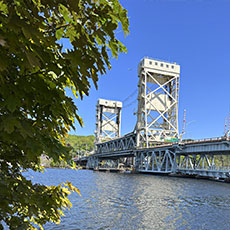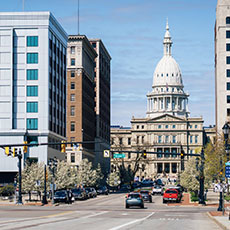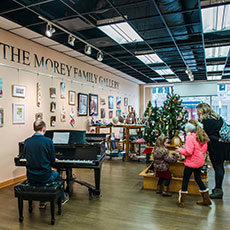Thousands of Resources, Ready to help.
Advantages
Popular

Michigan Talent Partnership Program
The Michigan Talent Partnership Program funding round closed September 26, 2025 and is anticipated to expend all available funds. Please contact Michelle Parkkonen for more information.
The Michigan Talent Partnership Program (“MTP”) is a grant program that aims to invest state funding in public space development projects in central city neighborhoods or concentrated districts designed to increase density, walkability, and vibrancy in Michigan’s central cities to attract and retain talent and create business ownership opportunities for local residents. Administered by the Michigan Economic Development Corporation (“MEDC”) and supported by the Department of Labor and Economic Opportunity (“LEO”), this program provides access to grant funding for transformational public space development projects in each of four cities identified in Section 528(13)(a)(i-iv) of Public Act 121 of 2024. Two cities in the Upper Peninsula and two cities in the Lower Peninsula with four-year public universities were also identified to apply. Awards may be based on individual application and/or based on funding rounds as determined by the MEDC.
Through the MTP Program, the MEDC partners with local communities to support talent attraction and retention by investing in transformational placemaking projects that create high-density, high-amenity, and vibrant street life neighborhoods/districts, with business ownership opportunities for residents.
Eligible applicants must be a consortium of entities that must include the local unit of government where the project funding will be expended. Eligible applicant consortiums may also include:
Consortiums must appoint a lead applicant, which may be one of the consortium entities or a nonprofit organization to serve as fiduciary and project manager for the consortium.
An eligible applicant may partner with the following to submit and implement an approved local plan:
No consortium may submit more than one (1) local plan. No prosperity region may receive more than one (1) grant.
“Eligible Activities” are at least one, or any combination, of the following expenditures:
In addition to at least one of the eligible activities above, local talent plans must include all the following:
Additionally, the following may be considered:
In evaluating each application, objective criteria will be considered including the following:
Competitive proposals will clearly include:
Funding availability is based on corporate income tax revenue deposited into the Revitalization and Placemaking Fund and appropriated for this program in accordance with Section 695 of the income tax act of 1967, 1967 PA 281, MCL 206.695.
All awards will be structured as performance-based grants with milestones and reporting requirements.
Only one project shall be awarded in each of the following cities and grant awards must have a minimum request of $500,000 (for a total project budget of at least $1,000,000) up to a maximum request of $17,460,000. Any one applicant may request up to that amount, but all final award amounts are subject to local talent plan and project competitiveness.
Only one project may be awarded in each of two (2) successful applicant cities and grant awards must have a minimum request of $500,000 (for a total project budget of at least $1,000,000) up to a maximum request of $6,790,000. Any one applicant may request up to that amount, but all final award amounts are subject to local talent plan and project competitiveness. It is the intent to award one (1) project in the Upper Peninsula and one (1) project in the Lower Peninsula.
Awards will be disbursed in multiple tranches. An initial twenty-five percent (25%) disbursement of the total grant funds shall be made to grantees. The remaining seventy-five percent (75%) of grant funds shall be disbursed to grantees on a quarterly reimbursement basis after MEDC satisfaction that the initial disbursement has been fully expended.
All MTP awards shall be memorialized by final written agreement with terms and conditions in accordance with these MTP Guidelines, and any applicable laws. These terms and conditions shall otherwise be satisfactory to the MEDC, and shall include, without limitation, performance-based milestones governing disbursements, repayment provisions, and periodic reporting to facilitate the MEDC’s report to the Michigan Legislature. The MTP agreements shall also include a provision for repayment due to breach of the written agreement.
Awarded Talent Plans

Ann Arbor
Cultivate Midtown: Funds will support the implementation of the 350 Transit Hub including streetscape improvements, public art, and revitalization of the Blake Transit Center as the center of a transformative, regional bus rapid transit network.
Funding Granted: $4,300,000

Detroit
Connecting Campus and Community: The Livernois Streetscape Extension will create a unified, walkable district along Livernois connecting McNichols and the Avenue of Fashion corridors, hubs of innovation and vibrancy in Northwest Detroit.
Funding Granted: $4,346,474

Grand Rapids
Monroe North: Work will be done to remove outdated, car-centric infrastructure and reclaim space for multi-modal transportation, high-quality infill, vibrant greenspaces and hillside access along Division and Ionia Avenues while supporting safe pedestrian spaces and transit opportunities.
Funding Granted: $4,3,00,000

Houghton
North Landing - A Waterfront Talent District: Funding will support the rehabilitation of a downtown building into a business and creative incubator space, strengthen multimodal connections between Houghton's natural, cultural and business assets and expand spaces for cultural connection and community engagement.
Funding Granted: $3,855,000

Lansing
REO Town - Flowing with Innovation: Various improvements throughout the REO Town neighborhood include district wayfinding, lighting and placemaking projects, multimodal transportation updates for safer pedestrian, transit and bike access, park and river access improvements and small business and entrepreneurial support.
Funding Granted: $4,350,000

Mt. Pleasant
The Central Market and Main District: Grant support will reconstruct and modernize the Farmer's Market Pavilion, transforming it into a year-round community and business hub that includes an incubator kitchen and will serve as a central gathering place, blending local food, entrepreneurship and cultural programming.
Funding Granted: $2,790,000